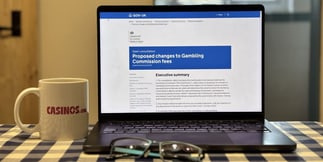Best Casino Game Odds: The Definitive Answer
Updated by Dr. Catalin Barboianu
Author and Fact Checker
Fact Checked by Lee James Gwilliam
Senior Vice-President
When choosing which casino game to play, one essential factor is the odds of winning. Why? Knowing which game has the best odds gives you a better idea of what to play before you get into all the strategies and tactics.
As per guidelines on responsible gambling, the better informed you are, the higher your chances of winning or limiting your losses.
Best Odds for Casino Games: TLDR
- 'Best odds' in gambling means the probability of winning a bet, average statistical return (opposite of house edge), and payout rate. These lead to different results when evaluating casino games.
- The casino games with the highest odds of winning an individual bet are: roulette (48.64%–47.36%), baccarat (45.86%), and blackjack (42.43%). However, these can shift as the games progress.
- Roulette allows players to increase odds significantly through combined bets covering more numbers. This way, you can get a winning probability of over 90%!. But profit margins drop sharply as more of the table is covered.
- The games with the lowest house edge are: blackjack (0.5%), baccarat (1% for best bet), craps and roulette (1.35%–1.36% for best bets). Skill impacts blackjack odds the most.
- Payout odds just show how much a winning bet pays out relative to stake. They don't precisely reflect winning probability or expected return, so should not be used to compare best odds.
- When picking casino games, think about what you enjoy and how much you want to spend, not just the odds. But knowing the odds helps make informed gambling decisions.
Navigation
Best Casino Game Odds? It Depends What You Mean...
Answering the question of which casino game has the best odds is not easy, for two main reasons:
- The concept of 'best odds' has different meanings in the gambling world.
- The odds may shift depending on how the game develops or the types of bets you want to make.
In this article, we look at these meanings in more detail and reveal which casino games offer the best odds for each category. This will help you understand what your chances of winning really are, and you can make more intelligent bets.
The Meanings of 'Odds' in Gambling
As I mentioned above, the term ‘odds’ has varying meanings in gambling. These diverse meanings lead to different results when we evaluate which casino games have the ‘best odds’. Being clear about the exact meaning helps us determine where the true advantages lie across different games.
When comparing the best odds across casino games, there are three main meanings we need to understand:
- The probability of winning a bet
- The average statistical return (which determines the house edge)
- The payout rate.
Let’s look at each of these in turn.
'Odds' Meaning 1: Probability of Winning a Bet
This is the most common meaning, as it refers to the mathematical chances or likelihood of a particular bet being successful. This probability can be precisely computed given the characteristics of the game and bet. It is typically expressed numerically as a fraction (e.g. 1/4), percentage (e.g. 25%), or in ratio format (e.g. 3:1).
When you look at casino games and their probability of winning bets, remember that this figure doesn’t show how well you’re doing overall. After all, a ‘win’ might refer to correctly predicting a particular outcome or turning an actual profit over time – two very different things.
Plus, high winning probabilities come with a proportional disadvantage in the form of low payout rates. This trade-off is central to casino game design. It allows the house to maintain its predictable mathematical edge across all bets and situations.

Casinos.com Tip
Identifying wagers with odds tilted in your favour gives you an initial edge. But that probability must be balanced against the low expected reward. Blindly chasing high winning chances without accounting for the full context can lead players astray, so be careful.
'Odds' Meaning 2: Average Statistical Return
The house edge refers to the average percentage of money retained by the casino for a particular game or bet. While the average return is what is left for the players (average return = 1 - house edge).
The average return is known as the ‘return to player’ (RTP) in the case of slots. Mathematically, the average return and house edge are complementary. The house edge is one (or 100%) minus the payback percentage returned to players. This means that if a game pays out 90% of bets to players on average, the house edge is 10%. As such, the lower the house edge, the higher the expected long-term return.
'Odds' Meaning 3: Payout Rate
This is how much a winning bet pays out relative to the original stake wagered. It is represented as a multiplier "X to Y", e.g. a 35 to 1 payout means a winning £1 bet will pay out £35 net.
This doesn't apply to slots, though. As we saw above, RTP is the metric commonly used to judge the likelihood of being successful here. This is how we can compare different titles to find the best payout online slots.
So, now we’ve established our definitions, which casino games offer the best odds for the different meanings? Let’s look at each one in turn.
Games With the Best Odds of Winning a Base Bet
In a nutshell, the top three casino games with the highest odds of winning a base bet are:
1. Roulette (48.64–47.36%)
2. Baccarat (45.86%)
3. Blackjack (42.43%)
These are theoretical probabilities (a priori odds) associated with the moment before the game starts. However, these odds can quickly change when the game progresses and circumstances change. For example, as cards are dealt in blackjack or if multiple bets are placed at once (like in roulette). So, let’s dive into each game in more detail.
Roulette: Base Bet Odds of 48.64–47.36%
In roulette, even-money bets such as red/black, odd/even, and high/low offer the highest probability of winning. It ranges from 47.36% to 48.64%, depending on the version. This makes roulette one of the best casino games in terms of raw winning odds on an individual bet.
But unlike other games, both real-life and online roulette can also increase the odds by placing multiple bets to cover more numbers. For example, combining a colour bet with several straight-up bets on the opposite colour. As more numbers are covered, the probability of winning increases.

Casinos.com Tip
The only way to enhance the winning odds for a static bet in roulette is through these combined bets. However, they should not be made randomly or chaotically. Placing a ‘contradictory bet’ - like putting the same stake on both red and black - won’t result in profit no matter what happens. It's pretty useless and can even lead to self-inflicted losses.
There are various categories of non-contradictory combined bets you can try, including:
- Red/black plus straight-up bets on opposite colour numbers, e.g. black bet plus straight-up bets on red numbers 13, 22, 29, 31, 33, and 35. This is equivalent to a high bet and six straight-up bets on low numbers and an even bet and six straight-up bets on odd numbers (and vice versa)
- Street bets predominantly on one colour plus an opposite colour bet, e.g. a street bet on 25, 26, 27 plus a black bet
- Line bets predominantly on one colour plus an opposite colour bet, e.g. a line bet on the numbers 10 to 15 plus a red bet
- Romanosky bets, e.g. a combined bet consisting of two bets on the first and second dozen plus two square bets on numbers 27 to 29 and 33 to 35
These are known as ‘large-coverage bets’. By optimally combining inside and outside bets, the winning probability of a combined bet can exceed 90%. This is significantly higher than that of individual bets.
However, achieving very high winning probabilities through combined roulette bets comes with trade-offs. The profit margins on such bets are extremely thin, often less than 5%. Not only that, the maximum possible losses increase as more of the table is covered.
So, while the odds of winning rise, the reward potential drops sharply. You’re virtually guaranteed tiny returns in exchange for accepting low risks.
In fact, by cleverly combining a colour bet with 17 straight-up bets on the opposite shade, players can achieve over 90% winning odds. The maximums are 94.59% in European roulette and 92.09% in American roulette. However, the profit rate ranges between just 0.0014% and 0.043%, so while you can win pretty easily, you may not get the outcome you hoped for.
Baccarat: Base Bet Odds of 45.86%
After roulette, real life and online baccarat offers the next highest winning odds on its base bets. In eight-deck baccarat specifically:
- The Banker bet has a probability of winning of 45.86%
- The Player bet probability is slightly lower at 44.62%
These probabilities remain static throughout the game. No additional bets or strategies can influence them beyond the initial choice.
Unlike roulette, however, the payout odds are not proportional to the winning probabilities. Both bets offer even money – meaning a winning £1 bet returns £2 (the original £1 plus £1 profit). So the Banker bet offers both the highest probability and payout, making it the single best bet to place in the game.
Blackjack: Base Bet Odds of 42.43%
In blackjack, the probability of winning a hand is 42.43% before any cards are dealt or revealed. This figure represents complete uncertainty about what cards might emerge. But once the first card is revealed, the odds shift dynamically based on mathematical calculations.
Advanced players often rely on 'basic strategy' charts to determine the best moves to make based on the cards they can see. By following these optimal decisions, they increase their expected win rate over hundreds and thousands of hands.
The following table shows the odds of winning with different totals. which you can use in a casino or if you're playing blackjack online.
The left column shows the possible totals you can hold. For each one, you can see your odds of winning according to the first card the dealer has.
Dealer’s first card Player’s result | 2 | 3 | 4 | 5 | 6 | 7 | 8 | 9 | 10 | A |
|---|---|---|---|---|---|---|---|---|---|---|
BJ | 1.00 | 1.00 | 1.00 | 1.00 | 1.00 | 1.00 | 1.00 | 1.00 | 0.92 | 0.69 |
21 | 0.88 | 0.89 | 0.89 | 0.89 | 0.90 | 0.93 | 0.93 | 0.94 | 0.89 | 0.64 |
20 | 0.76 | 0.77 | 0.77 | 0.78 | 0.80 | 0.85 | 0.86 | 0.82 | 0.55 | 0.51 |
19 | 0.63 | 0.64 | 0.65 | 0.66 | 0.69 | 0.77 | 0.73 | 0.47 | 0.434 | 0.38 |
18 | 0.49 | 0.51 | 0.53 | 0.54 | 0.59 | 0.63 | 0.37 | 0.35 | 0.32 | 0.25 |
≤ 17 | 0.35 | 0.37 | 0.39 | 0.42 | 0.42 | 0.26 | 0.24 | 0.23 | 0.21 | 0.12 |
Based on the deal's current state, these mid-game winning chances strongly favour the player in some situations. For example, a player holding a hard 20 has a 50-86% chance of winning, depending on the dealer's shown card. Identifying and capitalising on high probability situations is the key to long-term gains.

Casinos.com Tip
Baccarat has the highest raw probability on the initial bet. Following the optimal strategy can shift the odds in your favour under certain conditions later in the hand. This makes it a game of both luck and strategy rather than pure chance.
Games with the Lowest House Edge
The house edge represents the statistical advantage in favour of the casino. It is the average percentage of each bet that the house will retain over infinite repetitions. A lower house edge therefore gives the player a higher expected return.
Here are the casino games offering players the best odds in terms of lowest house edge:
1. Blackjack (standard 0.5% house edge)
2. Baccarat (around 1% for the most advantageous bet)
3. Craps (1.36% for the lowest one) and roulette (1.35% for the lowest one)
As above, let’s dive into the details a bit more.
Blackjack: House Edge of c.0.5%
Playing blackjack with perfect basic strategy gives you the lowest house edge, from as low as 0.13% in some variants to 0.94%, depending on the rules. For classic blackjack under common rules, the edge is approximately 0.5%. This is significantly lower than other major games.
This edge can be reduced even further by card counting and advanced tactics. Blackjack is the only major casino game where skill impacts the house advantage so greatly, making it the most profitable in the long run.
Baccarat: House Edge of 1%
For the popular table game baccarat, the Banker bet offers the lowest edge at just 1.06%, edging out the Player bet at 1.24%. Careful bet selection gives returns close to even with the house.
Roulette/Craps: House Edge of 1.35–1.36%
Roulette and craps also offer some bets with incredibly low edges.
In roulette, betting on red/black or odd/even gives a house edge of 1.35% (European) or 2.70% (American).
In craps, betting ‘Don't Pass’ yields an astonishingly low 1.36% edge for players – this is one of the lowest of any bet offered in casinos.
So while blackjack requires skill to achieve its low edge, favourable bets also exist in games of pure chance.
Payout Odds
The payout odds represent how much a winning bet will return relative to the original stake wagered. They are expressed as a multiplier, for example 35 to 1.
But payout odds should not be used as a measure of ‘best odds’ when comparing casino games. There are two reasons for this:
First, the payout odds do not precisely reflect the mathematical probability of that bet winning. Bets with higher payouts generally have lower chances of success. The exact winning probability and payout rate combine to determine the house edge.
Secondly, payout rates vary widely within each game. In roulette, odds range from 1:1 up to 35:1 on a single number. Across all games, payouts reach hundreds and even thousands to one on side bets. So comparing ‘highest payout’ between games makes little sense.
The expected return, encapsulated in the house edge, is a far more useful metric for players to judge best odds and make informed decisions.
Best Casino Games Odds Conclusion
We must be careful when using the term ‘best odds’ as related to casino games. There are two statistical meanings of the term ‘odds’, namely winning probability and expected return.
In the first sense, the casino game with the best odds of winning bets is roulette. Certain large-coverage bets offer probabilities of winning over 90%. However, there is a hefty price to pay from these odds in the form of a low profit rate. Next up are blackjack and baccarat, whose base bets have a winning probability of between 42%–46%.
The casino game with the lowest house edge and highest chance of winning is blackjack. Its house edge ranges from 0.13% to 0.94% across versions but stays under 0.5% with optimal play.
In contrast, the term ‘best odds’ is misleading when it refers to payout rate, so it’s probably best to avoid using it like that.
Roulette and blackjack are the most popular casino games, and this popularity seems to be related to our rankings with respect to odds.
Finally, remember that gambling should be a form of entertainment too, so you shouldn’t choose a casino game based only on the odds of winning. Your personal tastes, playing style, strategies, and other factors, including your bankroll, should also play a part.
Latest Casino News



Latest Casino Guides



Meet The Author
Experience
Dr. Catalin Barboianu has served the gambling industry as a games mathematician, problem-gambling researcher, and consultant since 2003. The author of 14 books (of which 10 focus on the mathematics of gambling) and 18 research articles in reputed journals, Catalin advocates for both safe, responsible gambling and for players to be exposed to the mathematical facts of gambling to help them avoid problem gambling. His work has been published by several esteemed publishers such as Taylor & Francis, Springer Nature, American Scientist, and Aeon.
Read Full Bio




